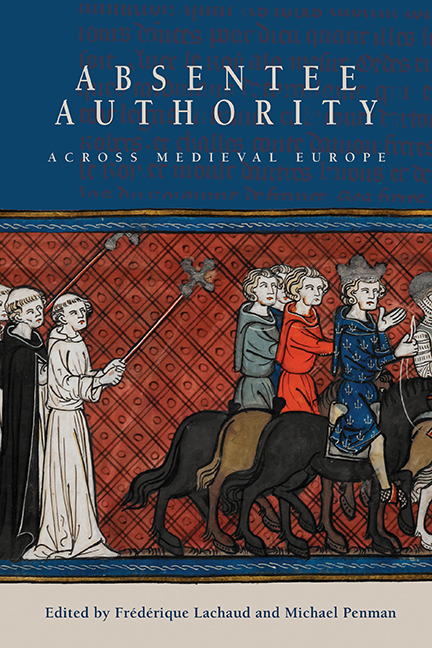Book contents
- Frontmatter
- Contents
- List of Illustrations
- List of Contributors
- Acknowledgements
- List of Abbreviations
- Introduction: Absentee Authority across Medieval Europe
- 1 Incarnating Authority, Exercising Authority: The Figure of the King in the Merovingian Era
- 2 ‘Ubi armae ibi princeps’: Medieval Emblematics as the Real Presence of the Prince
- 3 While the Bishop's Away …: Absentee Bishops of Parma during the Investiture Contest
- 4 An Inconceivable Absence: Usurpers and Illegitimate Rulers in the Genealogical Rolls of the Kings of England, from the Late Thirteenth to the Early Fifteenth Centuries
- 5 Local Loyalty and Absentee Authority in Thirteenth-Century Normandy: The Evidence of the Querimoniae Normannorum (1247)
- 6 Representation and Authority in Thirteenth-Century England and Gascony
- 7 Internal Exiles: Exclusion from the Fourteenth-Century English Court and Kingdom
- 8 ‘Si grant charté a Paris … par defaulté du roy’: Governmental Practice and the Customary Geography of the Absence and Presence of the King in France (1364–1525)
- 9 Was the Couple a Palliative to the Absence of the Prince? The Political Role and Influence of Margaret of Flanders during the Reign of Philip the Bold, Duke and Count of Burgundy (1384–1404)
- 10 Guardian – Lieutenant – Governor: Absentee Monarchy and Proxy Power in Scotland's Long Fourteenth Century
- 11 Absentee Authority in Late Medieval Iceland, as Viewed from the Literary Sources
- 12 Representatives of Kings and ‘Kings’ as Representatives: Authority and its Representation in Professional Groups in Late Medieval and Early Modern France – the Example of the King of Minstrels and of the King of Mercers
- Index
12 - Representatives of Kings and ‘Kings’ as Representatives: Authority and its Representation in Professional Groups in Late Medieval and Early Modern France – the Example of the King of Minstrels and of the King of Mercers
Published online by Cambridge University Press: 16 May 2018
- Frontmatter
- Contents
- List of Illustrations
- List of Contributors
- Acknowledgements
- List of Abbreviations
- Introduction: Absentee Authority across Medieval Europe
- 1 Incarnating Authority, Exercising Authority: The Figure of the King in the Merovingian Era
- 2 ‘Ubi armae ibi princeps’: Medieval Emblematics as the Real Presence of the Prince
- 3 While the Bishop's Away …: Absentee Bishops of Parma during the Investiture Contest
- 4 An Inconceivable Absence: Usurpers and Illegitimate Rulers in the Genealogical Rolls of the Kings of England, from the Late Thirteenth to the Early Fifteenth Centuries
- 5 Local Loyalty and Absentee Authority in Thirteenth-Century Normandy: The Evidence of the Querimoniae Normannorum (1247)
- 6 Representation and Authority in Thirteenth-Century England and Gascony
- 7 Internal Exiles: Exclusion from the Fourteenth-Century English Court and Kingdom
- 8 ‘Si grant charté a Paris … par defaulté du roy’: Governmental Practice and the Customary Geography of the Absence and Presence of the King in France (1364–1525)
- 9 Was the Couple a Palliative to the Absence of the Prince? The Political Role and Influence of Margaret of Flanders during the Reign of Philip the Bold, Duke and Count of Burgundy (1384–1404)
- 10 Guardian – Lieutenant – Governor: Absentee Monarchy and Proxy Power in Scotland's Long Fourteenth Century
- 11 Absentee Authority in Late Medieval Iceland, as Viewed from the Literary Sources
- 12 Representatives of Kings and ‘Kings’ as Representatives: Authority and its Representation in Professional Groups in Late Medieval and Early Modern France – the Example of the King of Minstrels and of the King of Mercers
- Index
Summary
If he is to govern anywhere, the king cannot be everywhere. In the struggle to gain influence over an ever-increasing number of territories and a diversifying society, communicating royal power in the absence of the king becomes a key concern. This holds true both for political kings and for those whom I would like to call the ‘other’ kings in the following pages: for in late medieval and early modern France, ‘professionals’ such as minstrels and mercers had kings of their own.
The first dimension of this inquiry concerns the ways in which these professionals maintained their king's presence during his absence. They used the title of ‘king’ in the same way as in the political sphere, which raises the question of whether their representative strategies were likewise borrowed from their political counterparts. The second aspect of the present research deals with the connection between these ‘other’ kings and political kings. Did the ‘other’ kings belong to an independent organization? Or were there connections between the sphere of the political king and that of professional kings in the areas of government and authority? Some of the evidence suggests that these ‘other’ kings originated as leaders of autonomous professional associations, but that political kings later turned them into deputies and representatives of their own authority by incorporating them into the court. This meant that political power was extended by integrating whole sections of society, such as minstrels and merchants, under the royal rule. This was done by turning the ‘other’ kings into representatives of royal political authority.
By focusing on the development of the professional groups of minstrels and mercers, and on their relationship with the king of France during the transition from the late medieval to the early modern world, this paper will first seek to explore how these groups of professionals dealt with the absence of their own kings. Second, it will be asked how the French kings used their ‘other’ counterparts in order to be present in new areas.
The social developments that transformed late medieval Europe saw an increase in the centralization of power, a monopolization of power by a few chosen rulers. This is especially true of France, where a process of State formation had been at work since the thirteenth century.
- Type
- Chapter
- Information
- Absentee Authority across Medieval Europe , pp. 240 - 254Publisher: Boydell & BrewerPrint publication year: 2017



